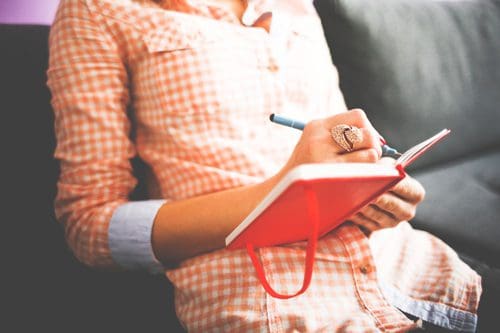If you really thought about it, what are you grateful for in this moment?
 When someone is feeling low, challenged by life, or unmotivated, the concept of gratitude is difficult to embrace. It doesn’t seem to have an immediate impact—or does it?
When someone is feeling low, challenged by life, or unmotivated, the concept of gratitude is difficult to embrace. It doesn’t seem to have an immediate impact—or does it?
Improved Mental Health
While it’s generally well known that people who intentionally reflect on the good in their lives are less depressed and happier, Greater Good Magazine outlines other scientific points, such as the effect on mental health with regular practices, like gratitude letters. Its researchers used 300 adult respondents for this study—one-third of the group wrote gratitude letters, another third wrote only about negative experiences, and the final third didn’t have a writing exercise. One notable finding: individuals who wrote gratitude letters experienced measurably-improved mental health up to 12 weeks after the study. Here are more details about the results.
Since its common for people in recovery to experience co-occurring depression, anxiety, and other mental health issues, practicing gratitude may be a helpful coping mechanism to discuss with your treatment specialist.
Want to try writing a gratitude letter? Here’s a tutorial.
Better Emotional Maturity
The definition of emotional maturity is the ability to handle conflicts or difficult situations without escalating them. This maturity has less to do with age—although life experience may help—and more to do with a healthy mindset developed through introspection and modified behaviors. The ability to express gratitude, says Harvard Medical School in a multiple-study examination, is a sign of emotional maturity.
So how does one begat the other? Practice. Perhaps through cognitive behavioral therapy or in a 12-Step group, you learned to make amends. Many addiction science experts believe this action heals you as well, which creates stronger emotional maturity. Through this, you develop the ability to not blame others for behaviors or problems—often an example of a victim mentality—but rather correct or fix them. Expressing gratitude also enhances your emotional maturity, because you understand the give and take in the world, and it’s easier to be thankful for people, circumstances, and your positive new direction.
The Good Men Project offers 10 habits to achieve emotional maturity that apply to everyone.
Enhanced Physical Health
Time magazine featured a collection of studies that outlined the positive effects gratitude has on sleep, eating habits, and other aspects of self-care. For example, people who “count blessings, not sheep,” according to Emma Seppälä, a researcher at Yale and Stanford Universities, sleep more soundly and for a longer period of time. Her theory is positive thoughts calm the nervous system, prompting better rest.
Cognitive scientist Susan Peirce Thompson believes that gratitude supports willpower, so if someone tends to overeat when stressed or make unhealthy food choices, “feelings of gratitude can boost impulse control”—which is an important factor in recovery as well.
Another study reported in Time indicated that people who practice gratitude are more likely to recognize the value of regular exercise, a whole foods diet, and seeking medical care when needed. Once again, it’s a reciprocal action: if you’re grateful for the wonder that is the human body and dedicate yourself to staying healthy, success with these aspects increases your level of gratitude.
How can you express gratitude for your state of being right now? Try the daily “three good things” exercise.
How to Practice Gratitude
Some people practice gratitude through prayer and devotion. Others demonstrate their “attitude of gratitude” by giving back to their communities. Including the suggestions above, here are additional ways to use gratitude as part of your healthy living routine:
- Consider a few good books. Emotional Success: The Power of Gratitude, Compassion, and Pride by David DeSteno; The Gratitude Diaries by Janice Kaplan; Gratitude by Oliver Sacks; and Thanks! How the Science of Gratitude Can Make You Happier by Robert Emmons are all easy entries into the concept.
- Keep a gratitude journal. During treatment, you may have learned how journaling helps you process emotions. A gratitude journal allows you to pause much in the same way to reflect on what your grateful for and how important these things, people, or moments are to you.
- Compliment and thank your loved ones. Recent research from the University of Georgia indicates that expressing appreciation toward a partner or another individual for what they do helps foster better gratitude and cultivate better relationships.
- Meditate. As you may have learned during rehab, mindfulness contributes a great deal to understanding the present moment, letting go of the past, and not worrying about the future. You can alter your meditation habit a bit by focusing on what you’re grateful for in that space and time.
- Tally up the little things. If you hear a bird singing, does that add to your happiness? When you finish the dishes, are you pleased to have everything tidy? When you have coffee with a friend who knows and understands you, does this make you feel content? Do you wake up in the morning and enjoy those first few peaceful minutes before the day begins? These and thousands of other personal little moments add to your well of gratitude. It’s easy to say, “I’m grateful to hear that sound…have a comfortable home…see that smile…enjoy this quiet…” and notice the difference.
Learn More Mindful Techniques at Twin Lakes
Our philosophy at Twin Lakes Recovery Center is to provide all the tools you need for a stronger connection between mind, body, and spirit. We want you to experience lasting, healthy change in your life and feel grateful for every new day. Join us in the beautiful Georgia countryside and see how we can help you.



